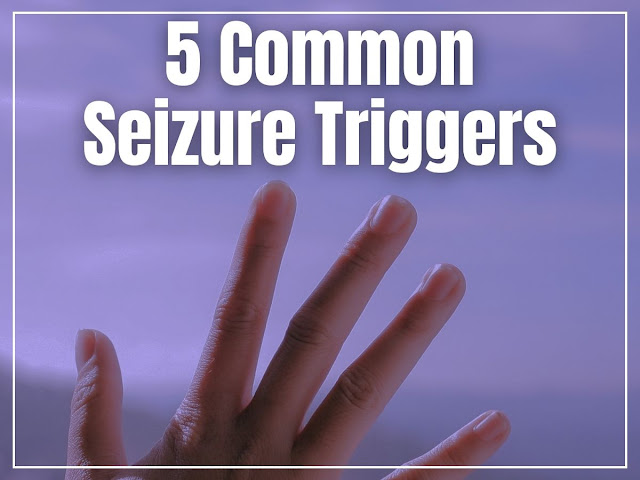Five Common Seizure Triggers Seen In Epilepsy
Seizure triggers are such an important part of anyone’s journey with epilepsy. People with epilepsy may or may not have seizures without being triggered first, but in any case, a person’s seizure triggers play a big role in that person’s lifestyle in most cases.
A good understanding of them can sometimes even lead to a seizure free life, but even in less ideal cases it could help manage the symptoms.
So today, I’d like to talk about five seizure triggers that are noticed a lot among the epilepsy community. Even if you’re not someone suffering from epilepsy, I think knowing the triggers for seizures could help you understand the condition a bit more.
And our first trigger is…
Sleep Deprivation
A lack of sleep is arguably one of the most common seizure triggers. It’s something that can actually trigger seizures in individuals that don’t have epilepsy, if that tells you how big of a role sleep plays when it comes to seizure activity.
This is because the electrical and hormonal activity in the brain changes when you’re asleep. These changes can cause seizures to occur when someone doesn’t get enough sleep, and they can also cause people to have seizures while they sleep. That can make it harder to get quality sleep, thus creating a difficult cycle.
But people with epilepsy need to aim for seven to nine hours of sleep per night, and depending on their specific needs they may even require more. If they receive less than that, then it could lead to an increase of seizures.
Stress
Another common seizure trigger, this is also one that is hard to manage for people with epilepsy because the condition itself often increases stress. Another important note to make about stress as a seizure trigger is that minor stressors can be just as big of a trigger as a large, stressful event. It really depends on the person.
For epilepsy patients who do find themselves triggered by stress, there are ways that you can potentially manage the symptoms. It’s difficult to cut out stress altogether, but potential treatments are learning coping mechanisms, avoiding stressful situations if you can, and doing relaxing exercises, among other other things.
Missing Medication
This is a potent trigger, but one that can typically be avoided more often than the others we’ve discussed so far. If a person with epilepsy doesn’t take their medication, especially if they miss more than one dose, then it could cause an increase in seizures as well as more serious seizures.
Since missing medication can be so dangerous, it’s important to never intentionally skip medicine unless directed to do so by your doctor. If you struggle with remembering to take your medication then you could set an alarm for that time of day, that’s personally what Rach does to remember hers.
And if you do miss a dose or are late taking a dose, then it’s normally recommended that you go ahead and take it as soon as you remember unless it’s too close to your next scheduled dose. If you’re unsure if you should take it or not, then it never hurts to contact your doctor and ask.
Hormones
Normally when we talk about hormones causing seizures it has to do with a female’s menstrual cycle. And to be fair, this is a huge issue for women and girls with epilepsy. Because the monthly hormonal imbalance that comes with their periods can cause an increase in seizures during certain times of the month.
But it’s worth noting that boys can have hormonal triggers as well, such as during puberty when their bodies are going through massive changes.
Hormones are hard enough to control on their own, and things are complicated even more when you add epilepsy to the mix. But sometimes there may be things that people with epilepsy can do to balance their hormones, through natural solutions or medication.
Alcohol Consumption or Drug Use
This is a trigger that definitely won’t affect everyone, but it’s still an important one to know about because it can be a dangerous one if people don’t know how serious it can be.
Alcohol consumption can be safe, if it’s not consumed in high amounts. So one or two drinks might not trigger seizures, but larger amounts of alcohol will. And of course, everyone’s alcohol tolerance is different, so you just need to be careful and mindful of alcohol if you have epilepsy.
Drug use for people with epilepsy is very dangerous, and could lead to a severe seizure or even death depending on the drug and the amount consumed. Don’t do drugs!
A Quick Note On Finding Your Triggers
Seizure triggers being such a large part of seizure control is one of the reasons why I advocate for keeping a seizure journal. Which is essentially where you write down an entry every time you have a seizure, taking note of the time of day, surrounding situation, etc.
If you start to notice a pattern, then you may have found a trigger. The key is consistency, you don’t want to label something that is related to one or two seizures as a trigger. But if something is going on around the time you have a seizure in numerous instances, then you may want to investigate further.
Conclusion
I hope that learning about some of the common seizure triggers has been informative and interesting to you, whether or not you have epilepsy. Seizure triggers are important to understand, but also complex since they vary from person to person.
Finding Rach’s triggers has been a long process that we’re still in the middle of, but being able to cut out things that are causing an increase of seizures is worth the time and effort put in.
Thank you for reading, and if you have anything you’d like to say about this topic then I’d love to hear from you in the comments!








Comments
Post a Comment